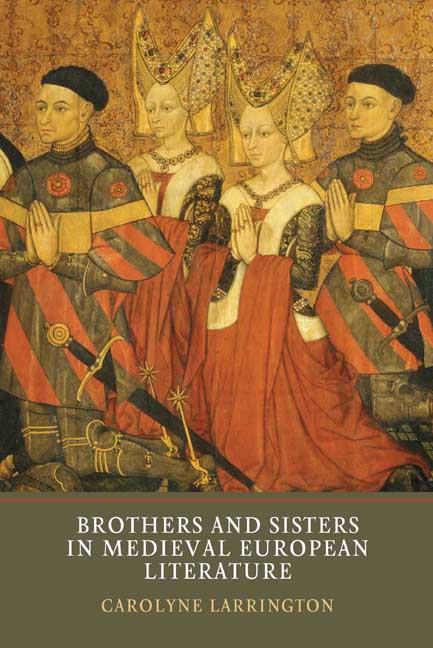Book contents
- Frontmatter
- Dedication
- Contents
- Acknowledgements
- Abbreviations
- Introduction
- 1 The Medieval Sibling in History
- 2 ‘Berr er hverr á bakinu nema sér bróður eigi’: Fraternal Love and Loyalty
- 3 ‘Io v’ho cara quanto sorella si dee avere’: Sisters, and their Brothers
- 4 ‘Næs þæt andæges nið’: Fraternal Hatreds
- 5 ‘Te souviegne de ce que je suis ta seur’: Sisters and Hostility
- 6 ‘The king’s dochter gaes wi child to her brither’: Sibling Incest
- 7 ‘So wil ich dir ce wibe mine swester gebn’: When Siblings Marry
- 8 ‘Trewethes togider that gun plight’: Fictive Siblings
- Conclusion
- Bibliography
- Index
- Frontmatter
- Dedication
- Contents
- Acknowledgements
- Abbreviations
- Introduction
- 1 The Medieval Sibling in History
- 2 ‘Berr er hverr á bakinu nema sér bróður eigi’: Fraternal Love and Loyalty
- 3 ‘Io v’ho cara quanto sorella si dee avere’: Sisters, and their Brothers
- 4 ‘Næs þæt andæges nið’: Fraternal Hatreds
- 5 ‘Te souviegne de ce que je suis ta seur’: Sisters and Hostility
- 6 ‘The king’s dochter gaes wi child to her brither’: Sibling Incest
- 7 ‘So wil ich dir ce wibe mine swester gebn’: When Siblings Marry
- 8 ‘Trewethes togider that gun plight’: Fictive Siblings
- Conclusion
- Bibliography
- Index
Summary
Why Siblings?
Sibling studies are the poor neglected stepchild of the history of the Western family. Interest in vertical relationships, in lineage and genealogies and in inter-generational strife has directed scholarly attention away from lateral ties, while Freudian paradigms have foregrounded mother–child bonds and the Oedipal acting-out of sons against fathers. The bond between brothers and sisters is, however, the relationship which lasts longest of all, from birth or shortly afterwards until death supervenes. From the beginning of the millennium historians of the family and literary scholars have been investigating sibling relationships in the post-medieval period, uncovering the social conditions which shape the sibling relationship and drilling down into the more abundant evidence of sibling emotions found in different kinds of post-medieval source. Only in the last ten years, particularly in France, have historians embarked on detailed analysis of medieval sibling relations. There has been even less investigation of brothers and sisters in the imaginative literature of the Middle Ages: it is this gap which this book aims to address.
The medieval family was, in many respects, as diverse in its formation as the modern family with its blends of half-, step-, full, adoptive and foster-children. Parental mortality rates, remarriages and expansion of the family group to increase the availability of labour were all factors that contributed to complex family structures and created distinctions amongst the cohort of siblings who regarded one another as brother or sister. Leonore Davidoff suggests that nowadays the individual is less likely to have a full brother or sister than at any time in earlier history, thanks to the prevalence of marital breakdown, new household formation and innovations in reproductive technology. Nevertheless, in the modern West 80 per cent of individuals do have a sibling: siblings who live much longer than their medieval counterparts, where child mortality ran at around 50 per cent. The modern sibling relationship can persist over seventy or more years: a truly life-long bond. Especially in childhood, sibling relationships are crucially formative of individual identity; behaviour is learned from peers as much as from parents, especially when older siblings assume care-taking roles, and innate personality traits are emphasized by the drive for differentiation from one's brothers and sisters. Sibling position is thus as important a constituent of identity as vertical lineage.
- Type
- Chapter
- Information
- Brothers and Sisters in Medieval European Literature , pp. 1 - 16Publisher: Boydell & BrewerPrint publication year: 2015



